Book download

Use the menu or < > to navigate the chapters
Foreword by MARIANNE THYSSEN, European Commissioner for Employment, Social Affairs, Skills and Labour Mobility
"On average, life expectancy increases by three months every year. Seen over the span of the last century, this is a testamentto enormous social progress."
(more quotes below)
"... since we are living longer, we also need to work longer so that the proportion of life spent in employment remains more or less constant. This is the basic premise for maintaining not only our pension systems but also the welfare state, solidarity between generations, and the social fabric."
"However, to make sure that everyone can work longer, it is not just pension systems that need reform. We need to promote active ageing, so that people who live longer are also healthy, both physically and mentally, and can therefore also work longer. We need workplaces to be adapted to ageing. We need working times to be adapted to people’s needs throughout life, and we need to maintain and update skills."
Work-life balance over the course of the working life
By ROBERT ANDERSON (Eurofound)
"Reconciliation between working and non-working life is a longstanding interest of the EU institutions, member state governments and social partners. At EU level, the issue of work-life balance has predominantly concerned work and the parental care of young children; however, challenges to work-life balance increasingly stem from the ageing of the population"
"More than one-quarter of female workers (27%) and a significant proportion of male workers (17%) provide care at least once a week."
"Twice as many women as men care for someone on a daily basis."
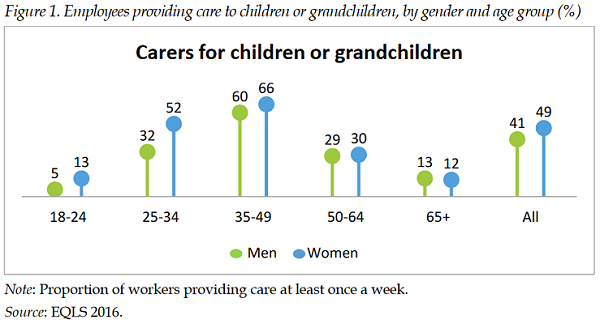
"The proportions of regular carers who are in employment are lowest in the Balkan and Mediterranean countries."
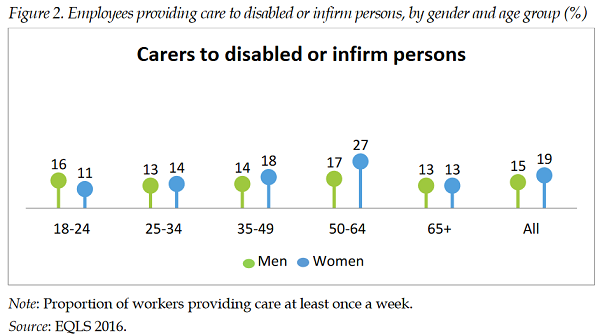
"Overall, women are more likely than men to report difficulties in combining work with care: 40% find it “rather” or “very” difficult, compared to 33% of men."
‘Til work do us part?’ Domestic relationships in extended working life households
By N. HUDSON-SHARP, A. CEBULLA, L. STOKES & D. WILKINSON (Niesr)
"The contribution men and women make to household domestic chores remains consistently unequal upon extending working life."
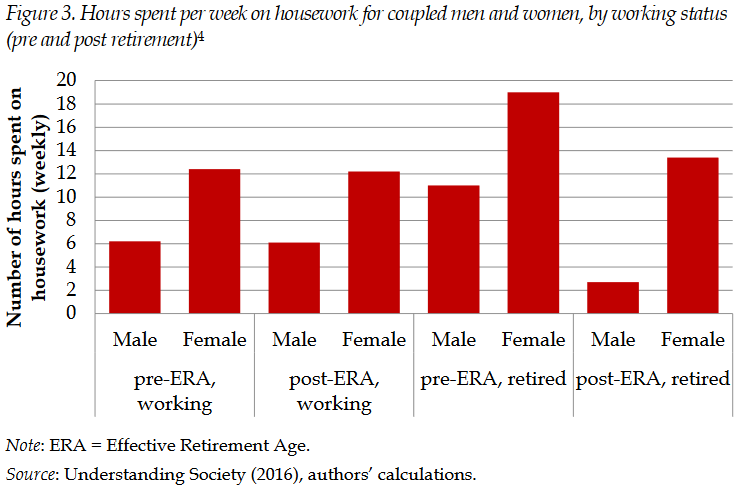
"While the work-life balance of older workers has increasingly become a focus of employer-related initiatives and research, little is known about the impacts of extending working lives on domestic divisions of labour."
"Our preliminary analysis has suggested, in line with existing evidence, that working longer may perpetuate unequal divisions of domestic labour."
Work-life balance policies and reconciling work and care
By GERD NAEGELE
"Care obligations towards children are still treated with more enthusiasm in public policy debates as well as in company personnel policies than the care of elderly persons."
"The overarching goal should be a sustainable and socially acceptable extension of working lives."
"Pension, retirement, employment and disability policies must be strategically linked to incentivising and activating employment policies, particularly at company level."
Working conditions at different ages: A sustainable work perspective
By OSCAR VARGAS (Eurofound)
"Workers aged 55 and over report less exposure to physical risks, shorter weekly working hours and greater working time autonomy; older employees also report better work-life balance."
"A lower occupational level is associated with poorer health and well-being."
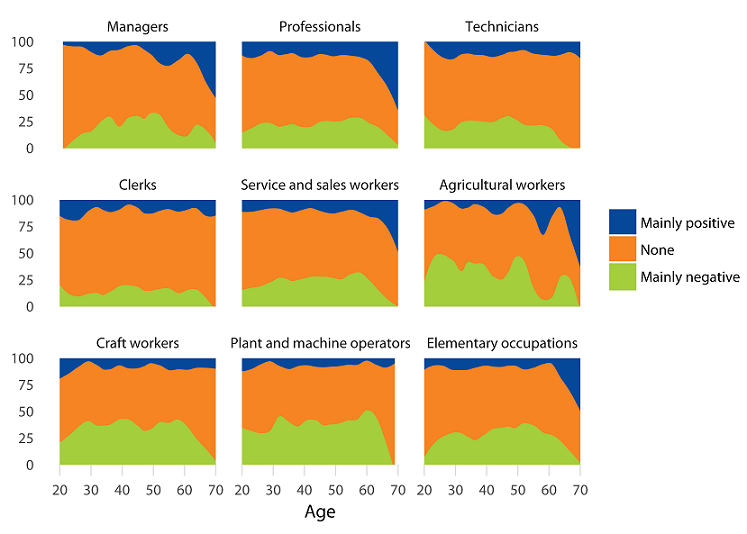
Working conditions and the length of working lives
By MIKKEL BARSLUND, ANDREAS CEBULLA and JACOB GARETH STAUNING PREWETT
"Find a strong positive correlation between working conditions and overall job satisfaction."
"Data show existing levels of job satisfaction among older workers to be very high."
"Improving working conditions alone will not drive a significant increase in the years spent economically active in."
Socio-economic inequalities in mortality and health
By JOHANNES KLOTZ and TOBIAS GÖLLNER (Statistics Austria)
"General research findings on differential mortality question the fairness of a uniform pension age when short-living poor people are likely to subsidise the pensions of long-living rich."
"Which part of excess mortality is attributable to personal responsibilities and which to external circumstances?"
"Mortality by socioeconomic status is not part of the European statistical system."
"To assess differential mortality in a comparative European fashion and with a variety of stratification variables, we developed the FACTAGE method for the EU-SILC User Database."
Extending working lives through flexible retirement schemes
By HANS DUBOIS (Eurofound)
"Partial retirement schemes facilitate reduced working hours for older people by providing a partial pension or benefit."
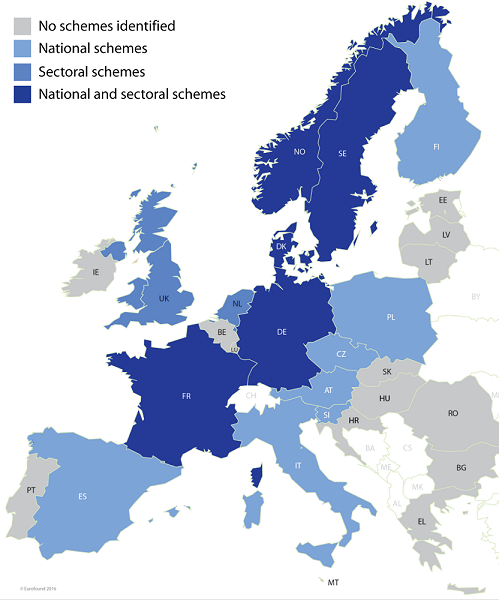
"Over one-quarter (27%) of workers in the EU say they would not be able to continue working until the age of 60."
"People who are entitled to the schemes may be unaware of their existence, access or precise consequences for future income."
Skill mismatch among older workers and workplace performance in Britain
By DAVID WILKINSON, LUCY STOKES, ANDREAS CEBULLA and NATHAN HUDSON-SHARP (Niesr)
"Mismatched workers whose skills are either over- or under-utilised have lower levels of job satisfaction than workers whose skills matched their jobs."
"Older mismatched workers were no more/less satisfied than mismatched workers aged 22 to 49."
"In workplaces where the majority of the workforce was aged 50 plus, having more workers whose skills are under-utilised is associated with reporting a better quality of service or product."
"Having workers whose skills are under-utilised when there are a lot of older workers in the workplace may have benefits for employers."
Skills mismatch among older workers
By MARKUS BÖNISCH, JAKOB PETERBAUER and EDUARD STÖGER (Statistics Austria)
"In general, older workers have lower skills than younger workers but tend to over-utilise their skills more. So the potential risk of skill loss would be higher for younger workers with less (skill) demanding jobs."
"The relationship between age and skill utilisation is still significant in all countries except England and Northern Ireland when controlling for many other variables."
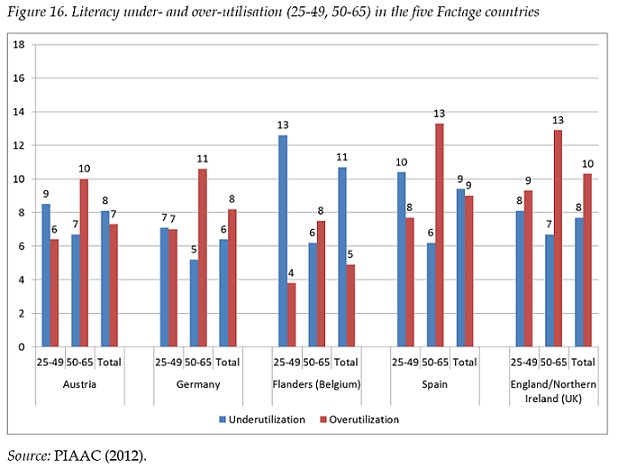
"We conclude that in some countries skills are more over-utilised than in others, and that some countries underutilise a large pool of skills. These national differences may relate to the fact that there are various national skill formation systems and different institutional settings in place."
Changing patterns of older workers’ employment: Evidence from Austria, Germany and the UK
By CHARLOTTE FECHTER and WERNER SESSELMEIER (University of Koblenz-Landau)
"The increase in part-time employment in Austria and Germany may be explained by the emergence of so-called mini jobs."
"We find that the implementation of Active Ageing measures – in particular later statutory retirement ages and the abolishment of early retirement schemes – prolong employment among older individuals."
"Differences in retirement regimes across countries influence older workers’ labour market performance. The policy challenges in each country thus depend on national institutional settings."
What factors drive longer working lives?
By MIKKEL BARSLUND and GILLES THIRION (CEPS)
"The change in activity rates between 2004 and 2015 for the age group of 55 to 69 year olds was 13.2 percentage points for men and 17.2 percentage points for women."
"Finally, health, education and occupation explain approximately another fifth of the change, taken together. Each factor on its own has had a minor impact on changes in labour market participation rates."
Active ageing: Much more than paid work
By ALAN WALKER (University of Sheffield)
"Active ageing is the process of optimising opportunities for health, participation and security in order to enhance quality of life as people age."
"A narrow focus on employment and extending working lives continues to dominate EU policymaking."
"The scientific evidence supporting active ageing is robust and growing continuously."
"An active aging strategy should respect diversity and not take the ‘one size fits all’ approach of the working longer policy."
"Realising a comprehensive strategy on active ageing would require a partnership between citizens and society."